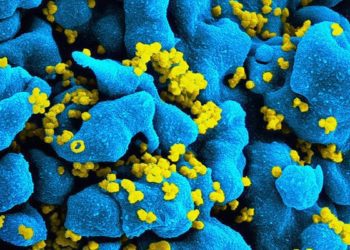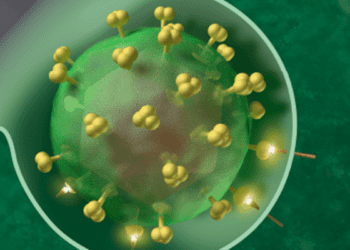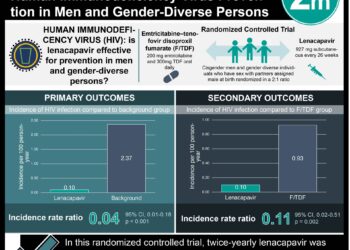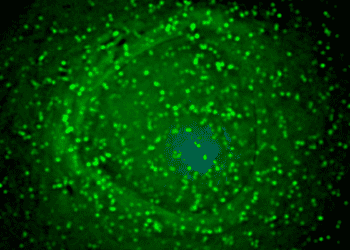Among HIV-positive infants, early protease inhibitor-based treatment effective
Image: PD
1. HIV-positive infants started on antiretroviral treatment (ART) for 40 or 96 weeks had lower morbidity and mortality rates than infants whose ART was deferred until CD4 fell below 25%.
2. The ART regimen of lopinaviar-ritonavir, zidovudine and lamivudine produced robust reductions in viral load in all cohorts.
Evidence Rating Level: 1 (Excellent)
Study Rundown: If HIV goes unrecognized and untreated in infants, it often results in death before 2 years of age. However, with proper ART, survival rates and quality of life increase dramatically. The Children with HIV Early Antiretroviral (CHER) trial was conducted to examine differences in morbidity and mortality between ART initiated soon after birth and deferred ART. The study found that by a median follow-up of 4.8 years, HIV-positive infants started on either 40 weeks or 96 weeks of a protease-based ART regimen within 6-12 weeks of birth had significantly lower mortality rates (p=0.02), fewer clinical disease events (p<0.0001), and fewer hospital admissions (p<0.0001) compared to those whose treatment was deferred. These results highlight the importance of starting ART treatment earlier rather than later in infants. Further, protease inhibitor-based therapy was found to be highly effective at reducing viral load, with few subjects requiring a switch to second-line therapies. The study is limited in that screening for HIV-positive infants began only after 4 weeks of age; therefore, no conclusions can be drawn about the efficacy of ART for in-utero versus intrapartum HIV infections. The authors also could not determine whether a 96-week course provided any additional benefit compared to a 40-week course of ART as the study was not sufficiently powered to detect differences between these two groups. Discovering the ideal length of time for an ART regimen in HIV-positive infants is an important next step that will further improve outcomes for these patients.
Click to read the study in The Lancet
Relevant Reading: Nevirapine versus Ritonavir-Boosted Lopinavir for HIV-Infected Children
Study co-author, Professor Mark Cotton, M.D., of Stellenbosch University in South Africa talks to 2 Minute Medicine:
“This important finding indicates we may be able to temporarily stop treatment and spare infants from some of the toxic effects of continuous ART for a while, if we can monitor them carefully. With ART coverage in children currently at just 28%, our findings highlight the urgency of increasing early (within the first 3 months of life) testing and treatment of HIV-infected infants.”
In-Depth [randomized controlled trial]: The authors enrolled HIV-positive infants aged 6-12 weeks (average = 7.4 weeks) with a CD4-positive T cell percentage of at least 25%. No previous ART regimens were allowed, except any treatment to prevent mother-to-child transmission of the virus. Of the 591 infants who were screened, 411 had a CD4≥25% and 377 were enrolled and randomized into three treatment groups: deferred ART regimen (125), 40-week ART regimen (126), and 96-week ART regimen (126). First-line ART consisted of zidovudine, lamivudine, and lopinavir-ritonavir. Enrolled infants were seen every 4 weeks until week 24, every 8 weeks until week 48, and every 12 weeks onward. Primary endpoints included death, failure of primary ART (CD4 dropping below 20% after week 24), clinical disease stage B events (e.g. cardiomyopathy and chronic lung disease) or stage C events (e.g. cytomegalovirus, disseminated tuberculosis, HIV encephalopathy, pneumocystis pneumonia, etc.) and drug toxicity that interfered with the prescribed regimen. Several secondary endpoints were also studied, including grade 3 or 4 clinical adverse events (e.g. acute renal failure, myocarditis, etc.) or laboratory adverse events (e.g. anemia, neutropenia, thrombocytopenia, elevations in AST or ALT, etc.), admission to the hospital and viral resistance. There were 23 deaths in the ART-Def group as opposed to 11 in the ART-40W group and 11 in the ART-96W group (p = 0.02). There were also more total clinical disease events in the ART-Def group (66) than in the ART-40W (38) and ART-90W (29) groups (p<0.0001), necessitating more hospitalizations in the ART-Def group (139 vs. 90 and 78, respectively; p<0.0001). There was no difference in drug toxicity or in the grade 3 or 4 clinical or laboratory adverse events between the 3 groups.
By Nick Woolf and Mimmie Kwong
More from this author: MERS remains poorly understood, deadly
© 2013 2minutemedicine.com. All rights reserved. No works may be reproduced without expressed written consent from 2minutemedicine.com. Disclaimer: We present factual information directly from peer reviewed medical journals. No post should be construed as medical advice and is not intended as such by the authors, editors, staff or by 2minutemedicine.com. PLEASE SEE A HEALTHCARE PROVIDER IN YOUR AREA IF YOU SEEK MEDICAL ADVICE OF ANY SORT.






